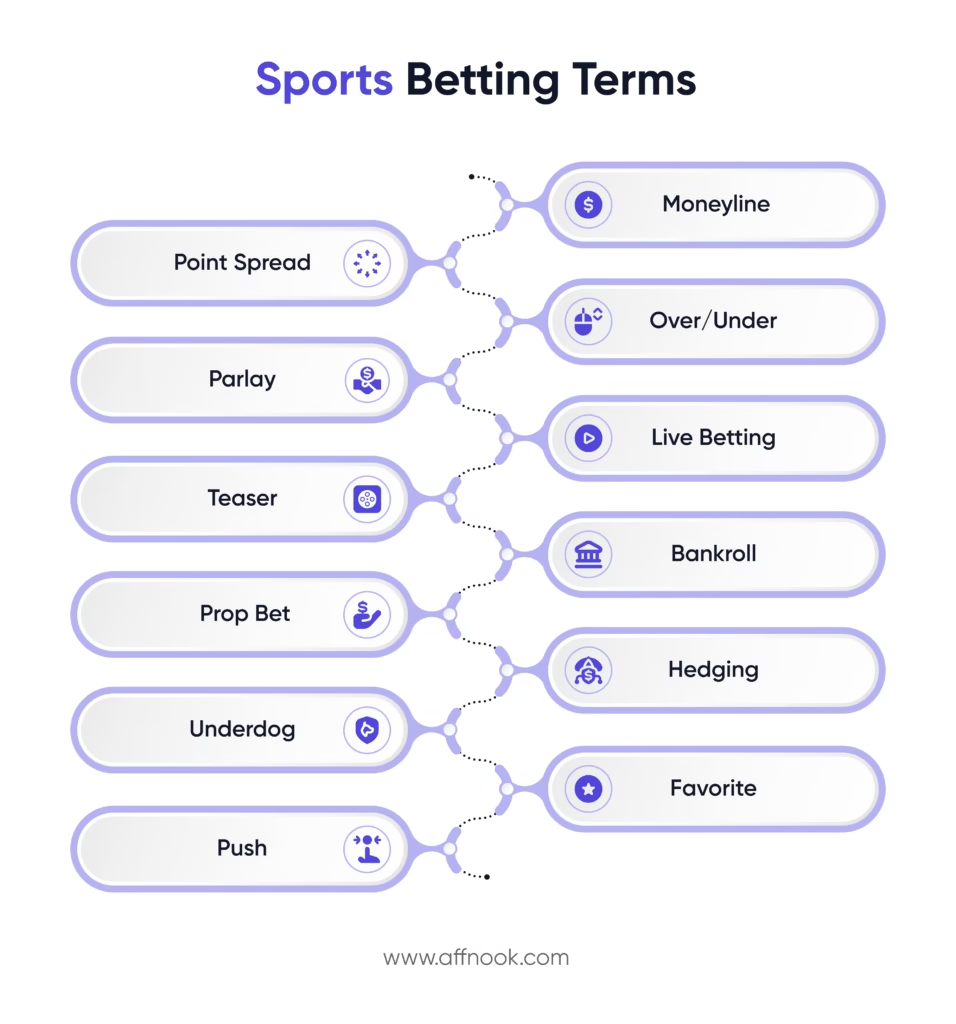Imagine this: you’re watching a cricket match with friends, and he says, I took the underdog on the moneyline, but I covered myself with a spread bet.
You laugh and nod, but deep down you’re wondering if he’s speaking English or some secret gambling code.
This situation is common because sports betting comes with its own dictionary of terms.
If you’re new to the world of sports betting, these terms might feel like a different language. But understanding them isn’t just helpful—it’s essential for making informed bets and avoiding mistakes.
In this article, we’ll break down the most common sports betting terms so you can follow the conversation, place smarter bets, and enjoy the thrill responsibly.
Why Knowing Sports Betting Terms Matters
Sports betting is one of the fastest-growing industries in the world. According to Statista, revenue in the global sports betting market is expected to reach $77.18 billion in 2025. With an annual growth rate (CAGR 2025–2029) of 5.30%, the market volume is set to climb to $94.89 billion by 2029.
With so many people participating, understanding the language of betting is no longer optional—it’s essential.
Here’s why:
- Better decisions: You’ll avoid betting blindly and instead choose smart wagers.
- Clarity: You’ll understand odds, payouts, and risks instantly.
- Confidence: No more awkward moments when others use terms you don’t know.
- Strategy: Familiarity with terms helps you build effective betting strategies.
The Ultimate Glossary of Sports Betting Terms
Sports betting isn’t just about picking winners—it’s about understanding the language that surrounds the game. This glossary breaks down the most important sports betting terms you’ll encounter, with simple definitions, real examples, and insights into why they matter.
1. Moneyline
Definition: A bet on which team or player will win the game.
Example: If the Lakers are +150 and you bet $100, you win $150 if they win. If the Warriors are -170, you’d need to bet $170 to win $100.
Why it matters: It’s the simplest and most beginner-friendly type of bet.
2. Betting Exchange
Definition: A betting exchange is a platform where bettors can place wagers against each other rather than against a traditional sportsbook. The exchange matches people who want to back (bet on) an outcome with those who want to lay (bet against) it. The exchange earns a small commission on winnings instead of setting odds itself.
Example: You want to bet on Team A to win, and another user is willing to bet that Team A will lose. The exchange matches your bets. If you win, the exchange takes a 5% commission from your profit.
Why It Matters:
- Provides better odds than traditional sportsbooks because you’re betting directly against other users.
- Lets you lay bets, which isn’t possible with normal sportsbooks.
- Encourages more flexibility and strategic betting.
3. Point Spread
Definition: A margin of victory set by sportsbooks to balance the matchup.
Example: If the Warriors are -5.5, they must win by 6+ points for your bet to win. If you take the Lakers at +5.5, they can lose by 5 or less—or win outright—and you win.
Why it matters: Helps make uneven games (favorite vs. underdog) more competitive for bettors.
4. Over/Under (Totals)
Definition: A bet on the total combined score of both teams.
Example: If the Over/Under is 210 in basketball, Over wins if the final score is 211 or higher; Under wins if it’s 209 or lower.
Why it matters: Perfect for bettors who care about game pace and scoring rather than who wins.
5. Parlay
Definition: A single bet combining multiple outcomes. All must hit for the bet to cash.
Example: Betting the Lakers to win, the game to go Over 210, and LeBron to score 25+. If all three happen, the payout is huge. If one fails, the whole bet loses.
Why it matters: High risk, high reward—one of the most exciting bet types.
6. Live Betting (In-Play Betting)
Definition: Wagering on games while they’re happening, with odds updated in real time.
Example: Betting on the next team to score during the second quarter of an NFL game.
Why it matters: Fast, interactive, and perfect for fans who watch games live.
7. Teaser Bet
Definition: A parlay bet where you adjust point spreads or totals in your favor, lowering potential payout.
Example: Moving a -7 spread to -3.5 makes it easier to win but reduces payout.
Why it matters: Adds flexibility for bettors who want less risk in parlays.
8. Bankroll
Definition: A bankroll is the total amount of money a bettor sets aside exclusively for wagering. It’s essentially your betting budget— money that you’re willing (and able) to lose without affecting your daily expenses or savings.
Example: Imagine you decide to dedicate $500 to the entire football season. That $500 is your bankroll. Each bet you place — whether it’s $10, $20, or more — comes from this pool. If you lose a $20 bet, your bankroll becomes $480.
Why It Matters:
Managing your bankroll is one of the most important aspects of sports betting because:
- It helps prevent emotional or reckless betting when chasing losses.
- It ensures you can keep betting for a longer period instead of going all in and losing everything at once.
- It supports a sustainable strategy where you can measure long-term profit or loss.
9. Prop Bet (Proposition Bet)
Definition: Wager on specific events within a game, not the overall outcome.
Example: Will Messi score the first goal? Or will the QB throw 300+ yards?
Why it matters: Fun, creative bets that attract casual and serious fans alike.
10. Hedging
Definition: Placing a second bet to reduce risk or guarantee profit.
Example: If you have a parlay riding on the Lakers winning, you might place a small bet on the Warriors to ensure you walk away with something no matter the outcome.
Why it matters: Smart bettors use hedging to manage risk.
Key Terms Every Sports Bettor Must Understand
Understanding key sports betting terms helps you make smarter bets and manage your bankroll effectively. Here are some essential terms:
Underdog
Definition: The team or player considered less likely to win a matchup, usually with higher payout odds.
Example: Lakers +200 are the underdogs against Warriors -250. Betting $100 on the Lakers could win you $200 if they pull off the upset.
Why It Matters: Offers higher rewards for taking calculated risks and spotting value in less-favored teams.
Favorite
Definition: The team or player expected to win, typically with lower payout odds.
Example: Warriors -250 are favorites against the Lakers +200. A $250 bet would return $100 if the Warriors win.
Why It Matters: Safer bets with lower payouts. Understanding favorites vs. underdogs helps balance risk and reward.
Push
Definition: When a bet ends in a tie, the wager is refunded.
Example: Spread is -3, and the team wins by exactly 3 → bet is a push, and your money is returned.
Why It Matters: Protects bettors from losing on exact outcomes and maintains bankroll integrity.

Key Bonus Terms Every Bettor Should Know
In sports betting, bonuses can make your wagers more rewarding, but the fine print matters just as much as the offer itself. To get the most out of these promotions, it’s essential to understand the sports betting terms linked to them. Below are the key bonus terms every bettor should be familiar with:
1. Sign-Up Bonus
Definition: A bonus offered to new users when they create an account with a sportsbook. It often comes as a deposit match, free bet, or no-deposit bonus.
Example: Sign up at a sportsbook and receive a 100% deposit match up to $200. Deposit $100, get an extra $100 in bonus funds.
Why It Matters: Provides extra betting funds to get started, reducing initial risk.
2. Welcome Bonus
Definition: A reward for new players, often included as part of a sign-up bonus. Can be a deposit match, free bets, or other incentives.
Example: A sportsbook offers a 50% bonus up to $150 on your first deposit.
Why It Matters: Encourages new users to start betting with extra funds.
3. Deposit Bonus
Definition: A bonus credited when you deposit money into your sportsbook account, usually as a percentage of your deposit.
Example: Deposit $50 and receive a 50% bonus ($25 extra) to use on bets.
Why It Matters: Extends your bankroll and lets you explore more betting opportunities.
4. Free Bet
Definition: A bet provided by the sportsbook that allows you to wager without risking your own money.
Example: A $20 free bet can be placed on any eligible game. If it wins, you receive the profit but not the stake.
Why It Matters: It lets you try new bets or strategies safely.

Final Thought
Learning sports betting terms is like learning the rules of a game—you can’t fully enjoy or succeed in it until you understand the basics. By familiarizing yourself with key terms like underdog, favorite, bankroll, push, and various bonus types, you gain the confidence to read odds, analyze matchups, and make informed betting decisions.
Knowing these terms also helps you:
- Avoid costly mistakes by understanding exactly how bets work.
- Maximize promotions and bonuses by knowing wagering requirements and eligible bet types.
- Manage your bankroll effectively for long-term betting success.
Sports betting can be thrilling, but it should always be approached responsibly and strategically. Start with smaller bets, track your progress, and use your knowledge of these terms to improve your chances of success.
Now that you’re equipped with this essential vocabulary, you’re ready to dive deeper into the world of sports betting with confidence, whether you’re placing simple moneyline bets or exploring more advanced strategies like parlays, teasers, and live betting.
Help Section
What are the most important sports betting terms beginners should know?
Some of the most important sports betting terms for beginners include moneyline, point spread, over/under (totals), parlay, bankroll, favorite, underdog, and prop bet. These terms form the foundation of sports betting and help bettors understand odds, payouts, and strategies. For operators, making these terms clear in user guides or onboarding tutorials builds trust and reduces friction for new players.
Why is it important for operators to explain sports betting terms to players?
Clear explanations of sports betting terms reduce confusion and improve user experience. Bettors who understand concepts like bankroll management, wagering requirements, or live betting are more likely to engage responsibly and return to the platform. For iGaming operators, offering glossaries, tooltips, and FAQs increases retention rates and positions the brand as transparent and player-friendly.
What is the difference between a favorite and an underdog in sports betting?
A favorite is the team or player expected to win, usually with lower odds and smaller payouts. An underdog is less likely to win, but offers higher odds and larger payouts. For example, if the Warriors are -250 favorites, a $250 bet wins $100. If the Lakers are +200 underdogs, a $100 bet wins $200. Understanding these sports betting terms helps bettors balance risk and reward.
How do bonus terms like sign-up bonuses and free bets work in sports betting?
Bonus terms are critical in sports betting promotions:
Deposit Bonus: Extra funds based on a percentage of the player’s deposit.
For iGaming brands, clearly defining these terms avoids compliance issues in regulated markets and helps players maximize value responsibly.
Sign-Up Bonus: Given to new users after creating an account, often as a deposit match or free bet.
Free Bet: Allows players to bet without using their own money; winnings exclude the stake.
What role does bankroll management play in sports betting?
Bankroll refers to the money set aside exclusively for betting. Effective bankroll management—typically risking only 1–5% of the total bankroll per bet—helps bettors play responsibly, avoid chasing losses, and sustain long-term engagement. For operators, educating players about bankroll management supports responsible gambling initiatives and enhances brand reputation in regulated markets.




